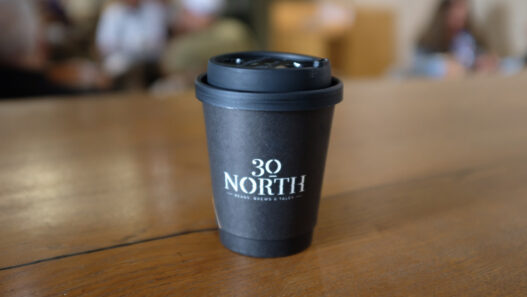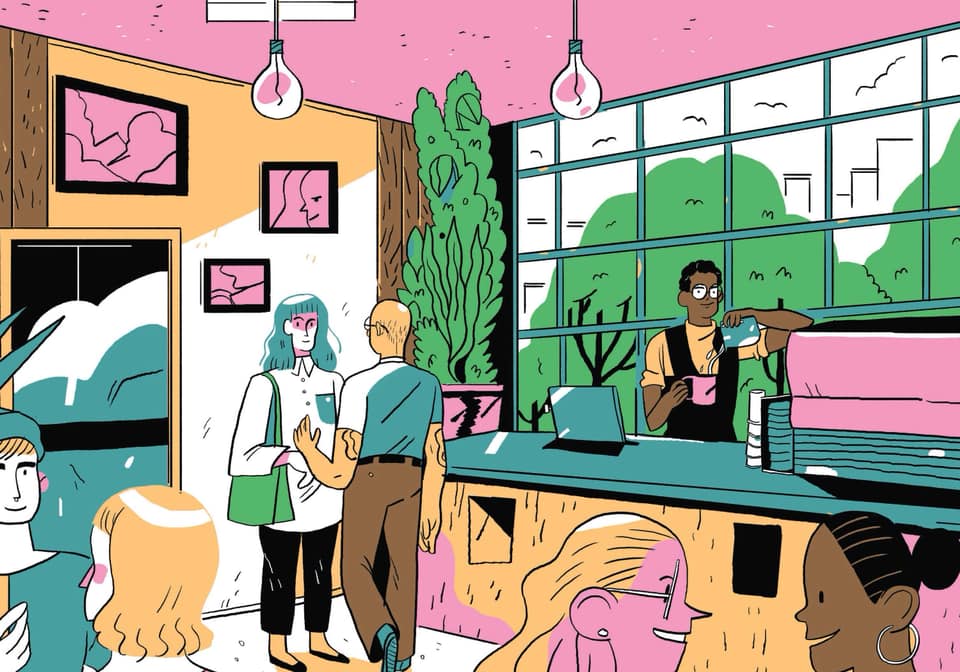Inclusive hiring practices are having a big moment, but neurodiversity is often left out of the conversation. And even when the hiring process has been adjusted, training and retention strategies leave much to be desired. Diversity, equity, and inclusion strategies are always works in progress. Many times, what some would consider “accommodations” for marginalized groups are actually beneficial to everyone.
But some cafes take a different, more focused route when it comes to neurodivergent workers, and across the United States there is a growing cadre of cafes created specifically with neurodivergent workers in mind. Some are independent businesses; others are attached to nonprofit organizations. All of them have actionable insights to share, but no strategy is one-size-fits-all on a topic as broad and wide-reaching as this one.
Australian sociologist Judy Singer coined the term “neurodiversity” in 1998 to describe the many different ways a human brain develops and functions. Being “neurodivergent” is not indicative of a medical diagnosis and is often self-identified. The term covers traits common to and diagnoses of autism spectrum disorder, ADHD, Tourette syndrome, dyslexia, and more. Because the typical employment process was not designed to include neurodiversity, neurodivergent people frequently find themselves working without adequate support. According to the University of Connecticut, “Unemployment for neurodivergent adults runs at least as high as 30-40%, which is three times the rate for people with disability, and eight times the rate for people without disability.”
View this post on Instagram
Dan Donoghue opened Kickback Cafe in Oregon, Wisconsin with his wife Elizabeth Donoghue about one year ago. From the beginning, the goal was to “have a business that wasn’t just in the community, but was part of the community in the fully engaged sense.” Dan Donoghue is neurodivergent and also has two autistic children.
The one mantra he emphasized throughout our interview was “be kind.” Instead of a formal hiring interview, where one sits down face-to-face with inane questions like “what is your biggest weakness,” Donoghue opts to have an informal conversation. From there, he can get a good feel for the person to answer his culture fit questions along the lines of “Are you kind? Are you open-minded to be able to pick up skills and be tolerant? Because being kind extends to everyone.”
The other part where the kindness approach is applied is in the training process. “The big thing that I see is that people are very willing to train things in a certain way,” Donoghue says. They’re less willing to adapt their training style to the person.” There are many learning styles, and “anything can be done five ways.” Kickback employees start with learning basic skills and then rotate around to different stations before joining the group. Instead of a rigid training timeline, he says, “We go on the person’s comfort level, not ours,” says Donoghue, who finds that outcomes are much better when you meet people where they’re at and teach to their learning style.
“What we’ve learned is as long as you’re willing to communicate in the way that that person prefers or needs to be communicated with, then you’re fine,” Donoghue continues. “We’re strong believers that if someone’s doing something wrong, it’s your fault because you didn’t train it right. And obviously, there are exceptions to that, but for the most part, people want to do their job.”
This is a far cry from corporate training programs that put you on notice if you’re not meeting milestones on time.
“There were days worth of training that focused on: you always need to be engaging customers in conversation, you always need to be smiling and making eye contact, and giving people a legendary customer experience,” says Arielle Rebekah, a seven-year coffee professional who is neurodivergent and operator of the blog and podcast “Trans & Caffeinated.” The corporate coffee training program they took part in presented a significant roadblock, as there were no deviations from what was expected to succeed. “The expectation is set in training that if you don’t communicate that way, then you are not meeting expectations of the job,” they tell me. “I feel this just sets neurodivergent folks up for failure.”
View this post on Instagram
DIRT Coffee in Littleton, Colorado, is a nonprofit that provides workforce development programs and operates a cafe. The cafe has a neurodiverse staff, and DIRT’s nonprofit programs include a three-month paid internship, employer training, and mobile truck “Dirt on the Road.” Rafael Levy, the cafe’s general manager, describes DIRT’s mission as “to be able to disrupt the way that neurodivergent people are viewed in society. And to be able to create a more equitable workspace not only for neurodivergent people but in general, for the disability community.” His approach to interviews is similarly casual to Donoghue’s and says their training is “incremental,” then built up as baristas feel more comfortable with tasks.
Interns spend their first month trying out every position in the cafe to see what each is like (the cafe is still fully staffed during the program) and then decide where they’d like to spend the remaining two months. They’re also evaluated after every shift to monitor growth. “We’ve developed a rubric tracking system. So we track lots of different transferable skills, both hands-on and soft skills,” says Jenna Franck, DIRT’s inclusive employment manager. “After going through this program, a lot of them have reported that they feel more confident and higher self-esteem going into a workplace. They’re able to go into the workplace and request necessary accommodation to better advocate for themselves.”
On the other side of the employment coin—and available for free for those in Colorado—is the employer training program. Franck performs an in-person consultation with the business and then devises an action plan for them to follow. “They’re always surprised to find that 60% of accommodations cost a business nothing,” observes executive director Catharina Hughey. “One of the things that we say is that accommodation really is, first off, just listening to your employees and what it is that they need support.” Simple adjustments like changing a trash bag closure to a drawstring or adjusting your hiring to be more skill-based (is your “required” competency more “recommended”?) go a long way.
View this post on Instagram
In Boca Raton, FL, Special Percs is a cafe operated by the Unicorn Children’s Foundation, a nonprofit dedicated to “creating cradle to career pathways for kids and young adults with developmental differences and helping their families navigate the complex journey.” The cafe began because they were “looking for opportunities for programs to employ individuals with developmental differences within our Unicorn Connection Center,” says communications manager Amy Mann. Like Unicorn’s other vocational programs, the coffee training program was not started from scratch. Instead, they tapped Renée Espinoza, an authorized SCA trainer (AST) and co-founder of Firedancer Coffee Consultants, to use and adjust existing learning materials. Rather than a day-long class, she conducted shorter sessions over several weeks.
The Unicorn staff supports the program material development with existing “expertise in supporting learners that have different modalities of learning,” says Kerri Morse, Unicorn’s programs and business development consultant. Past training programs include SCA’s Barista Skills and Brewing Foundations, intro to tea, and food handling certification. The physical portion of training is completed either in the Special Percs cafe or, if the students are out of state, in cafes that volunteer their space.
After graduating, local students are placed in a paid internship with a business already in partnership with Unicorn. Like DIRT Coffee, Special Percs also works with business owners to establish how to support the interns. Morse says they try “to create onboarding procedures and training procedures that would not only benefit that individual, but all of the employees working in the cafe.”
She illustrates an example: “So if it’s a complex task, like making a certain drink, then maybe we want to host a video modal that any of the employees can access to remind them how to make the drink. But really making sure that those are available not only to our individual but everybody as a whole. And then the managers really do find that it works for everyone.” This echoes Donoghue’s earlier point of teaching to the individual’s learning style.
November ’21 program graduate and now-barista Maria Schenck says in an email that “working at the cafe helped me with becoming a better employee and helping others who are coming to the cafe.” One common trend that Hughey noted between interns and businesses is retention: both interns and employers are looking for long-term employment and employment security.
Neurodiversity programs have been shown to be a competitive advantage—one company’s preliminary results showed a 30% increase in productivity—however, it shouldn’t take a productivity statistic to convince you to be inclusive of neurodivergent people. Accommodations do not need to be difficult to implement and are also not beneficial solely to neurodivergent people. If you don’t know where to start, reach out to organizations like DIRT, Unicorn, or your state’s Department of Vocational Rehabilitation.
Many of my interviewees reiterated how important it was to be flexible and compassionate. I think it keeps coming back to the words that Dan Donoghue of Kickback Coffee: “Treat people like people.”
Jenn Chen (@thejennchen) is an Editor At Large at Sprudge Media Network. Read more Jenn Chen on Sprudge.
























